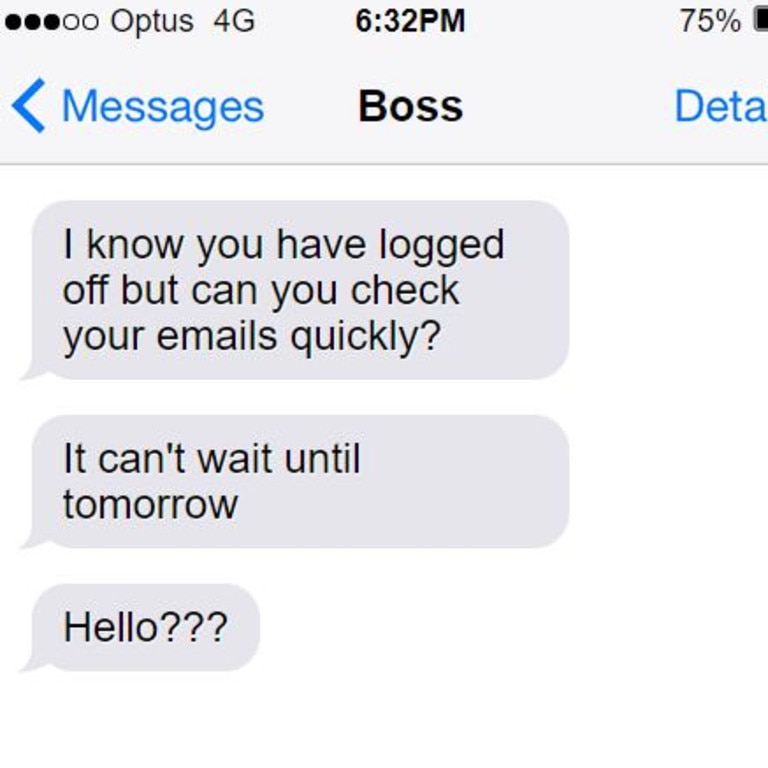Massive change for Australian workers as Right to Disconnect laws loom
From today, new work laws will kick in across the country that will have a massive impact on Aussie workers – but not everyone is happy.
Have you ever had your boss call you demanding answers to a work related matter that could have definitely waited until Monday?
Or maybe you have received multiple emails outside of work hours and, when you didn’t respond, your boss has then followed up with text messages?
Well, from Monday, Aussie workers across the country will legally have the right to ignore those pesky calls, texts and emails.
From August 26, staff working at a business with 15 or more employees will officially have the “right to disconnect” outside of work hours.
These rules will also apply to small businesses from August 26, 2025.
This means employees will have the right to refuse contact outside of their working hours, along with the right to refuse to monitor, read or respond to contact from an employer or third party.
This is all within reason of course and there are several factors that need to be considered before turning your phone on “do not disturb” or muting all emails from your boss.

How will the new Right to Disconnect laws impact you and your work situation? Share your thoughts: alexandra.foster@news.com.au
Things such as the reason for the contact, how the contact is made and how disruptive it is to the employee and their personal circumstances, such as family or caring responsibilities.
Another factor is whether the worker is being compensated or paid extra to be available to be contacted to perform work within a specific period or for working additional hours outside of their ordinary work.
The nature of the employee’s role and their level of responsibility within the business also needs to be considered when determining if their refusal is reasonable.
Any disputes about an employee’s right to disconnect that can’t be resolved at a workplace level can be referred to the Fair Work Commission.
From there, the Commission can make a stop order, deal with the dispute in another way, such as holding a conference to try and reach a resolution, or it can do both of these things.
It appears that many employees are viewing this change as a positive step, particularly with the shift away from the hustle mentality culture we have seen in recent years and the increased focus on having a healthy work-life balance.
Recent polls of more than 800 Australians conducted by people2people Recruitment found 78 per cent of workers surveyed said they were more likely to work for a company with a clear right to disconnect policy.
People2people Recruitment’s head of HR solutions Suhini Wijayasinghe said, from an employee perspective, she knows first-hand how difficult it can be to set clear boundaries, especially for those who work from home.
“This isn’t always possible and becomes even more challenging to apply when working with overseas teams as the time difference gets on the way, but also with teams that benefit from flexible work hours,” Ms Wijayasinghe said.
But while many workers are feeling positive about the change, employers have expressed some hesitancy about the change.
The survey revealed that for Australian employers, one of their big concerns is around the difficulty to enforce such rules, followed by the impact on the work culture, productivity and collaboration.
However, Ms Wijayasinghe said this new law is a chance for employers across the country to make a positive change in our their business operates.
“While there are concerns about implementation and the potential impact on work culture, these laws also offer an opportunity to create a more respectful and supportive workplace,” she said.
“By taking proactive steps, both employers and employees can successfully navigate this transition and enjoy the benefits of a more balanced and fulfilling work life.”

Clear divide in response to new law
While many Australians are excited at the prospect of not feeling pressured to answer their boss’s 6pm call or worry they will be penalised for not immediately responding to emails that roll in after they clock off, it seems there are some that really aren’t happy about the change.
When the change was first included as an amendment in the Federal Government’s Closing Loopholes Bill it sparked a huge response and exposed a pretty clear generational divide.
A quick look on social media showed a significant number of people in the baby boomer generation slamming the move.
While they were not the only Aussies voicing their concerns with the changes, they appeared more likely to be against the changes than younger workers.
Accusations of younger workers being “lazy” were being thrown around, along with claims the changes would make it even more difficult for businesses to run properly.
One older Aussie even went as far as to brand the proposed legislation “disgusting”.
“Why would you bother having a business and employing people. Too many rules too much unionism, too many lazy workers who want money for nothing. May as well work solo,” one social media user said.
Another claimed the changes showed Australia was “on the road to ruin”, adding they were “making it more difficult for small businesses to employ people. Get rid of this dangerous clown show”.
Someone else branded the laws were unnecessary because “your boss can only annoy you after hours if you let them”.
This was a sentiment echoed by Flight Centre chief executive Graham Turner, 74.
“From our point of view I can’t see why people can’t disconnect if they want to anyway. All they have to do is switch your phone off or switch your laptop off,” he told The Australian Business Network at the time, adding that the proposed changes were “overkill”.
“I suppose it depends on what your position is. If you’re a senior executive you have to accept calls and you certainly would not get a promotion to that sort of level if you didn’t.
“My gut feeling is that it’s a total over-reaction on something that’s not an issue.”
Originally published as Massive change for Australian workers as Right to Disconnect laws loom



